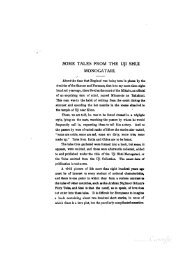Chau Ju-Kua - University of Oregon Libraries
Chau Ju-Kua - University of Oregon Libraries
Chau Ju-Kua - University of Oregon Libraries
You also want an ePaper? Increase the reach of your titles
YUMPU automatically turns print PDFs into web optimized ePapers that Google loves.
1,39 PHILIPPINE ISLANDS. 159<br />
9) It is custamary in China for hidg <strong>of</strong>ficials to receive the visits <strong>of</strong> their subordinates<br />
on the first and fifteenth <strong>of</strong> each moon, and these days are the ordinary holidays <strong>of</strong> the people,<br />
on which they make visits.<br />
^°) WK f^ ^^^ ^^^^ character stands for ^ oto go to», Bto travels. Pei-wbn-yan-fu,<br />
5 46,98 gives several quotations <strong>of</strong> analogous terms; e. g.,<br />
jjjg_ ^^^ «a farewell dinner to a parting<br />
friends also «a viaticumn.<br />
11) The feast <strong>of</strong> <strong>Kua</strong>n-yin, the patron <strong>of</strong> sailors, see supra, p. 69. Buddhism was not unknown<br />
in Borneo in mediaeval times, though the date <strong>of</strong> its appearance there is uncertain. See Lassen,<br />
Indische Altherthumsk. IV, 582. Crawfurd, J. E. G. S., XXIII, 83.<br />
10 12) Can these pearls be the same Pigafetta speaks <strong>of</strong> in his Narrative? «They say that the<br />
king <strong>of</strong> Burne (Brunei, W. Coest <strong>of</strong> Borneo) has two pearls as large as a hen's eggs, and so<br />
perfectly round that if placed on a smooth table they cannot be made to stand stiH». See First<br />
Voyage round the World by Magellan (Hakl. Soc. edit.), 117, 120. -j^ '^ «humaushape»,<br />
according to the Fang-yea ^ossary in K'ang-hsi tzi-tien. The statue is placed in contrast with<br />
15 the pearls.<br />
13) The full text <strong>of</strong> this letter <strong>of</strong> the ruler <strong>of</strong> Borneo is given in Sung-shi, 489,18. The<br />
king's name is there said to be Hiang-ta (fS] ^) and that <strong>of</strong> the envoy P'u Lu-sie (»^<br />
said in his letter to the Emperor <strong>of</strong> China concerning this envoy: ((Recently<br />
fM. ^)0- '^^^ ^^"^S<br />
there was a trader, P'u Lu-sie by name, whose ship arrived at the mouth <strong>of</strong> my river; I sent a<br />
20 man to invite him to my place, and then he told me he came from China. The people <strong>of</strong> my<br />
country were much pleased at this, and, preparing a ship, asked this stranger to guide them to<br />
the Court ....» See Groeneveldt, Notes, 109. It appears from this that it is to the enterprising<br />
Arab traders <strong>of</strong> Canton, or Ts'iian-chou, that belongs the credit <strong>of</strong> opening relations between<br />
China and Borneo.<br />
25 14) Sung-shi, 489,19* gives the name <strong>of</strong> the king <strong>of</strong> Borneo as Si-li-ma-jo (^^ j||<br />
ffiR r^-) which may be Sri Maharaja or Maradja. The mission sailed back from Ts'iian-chou.<br />
15) These islands must probably be looked for in the Celebes and Moluccas; there is nothing<br />
to indicate how the nineteen characters which give their names should be grouped. The division<br />
here adopted is purely tentative. The first name may be Serang or Coram, the third Gilolo. Wu-<br />
30 li-ma may be the same as the Wu-li (/^ JB) <strong>of</strong> Yuan-shi, 162 which Groeneveldt, Notes,<br />
27, thought might be Bali, but this seems doubtful. — Tan-yu suggests Ternate, and Ma-jo<br />
Mahono, but none <strong>of</strong> these islands produce any kind <strong>of</strong> gharu-wood.<br />
40.<br />
PHILIPPINE ISLANDS.<br />
35 , IWa-i (ifi ^).<br />
The country <strong>of</strong> Ma-i is to the north <strong>of</strong> P'o-ni \ Over a thousand families<br />
are settled together along both banks <strong>of</strong> a creek (or, gully ^). The natives<br />
cover themselves with a sheet <strong>of</strong> cotton cloth (^ ^ ^B ^),<br />
lower part <strong>of</strong> the body with a sarong (lit., «loin-cloth» ^ ^).<br />
40 There are bronze images <strong>of</strong> gods ('^),<br />
or hide the<br />
<strong>of</strong> unknown origin, scattered<br />
about in the grassy wilderness 2. Pirates seldom come to this country.<br />
When trading ships enter the anchorage, they stop in front <strong>of</strong> the<br />
<strong>of</strong>ficials place, for that is the place for bartering <strong>of</strong> the country. After a ship

















